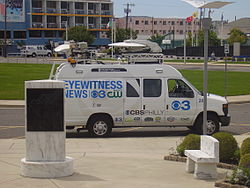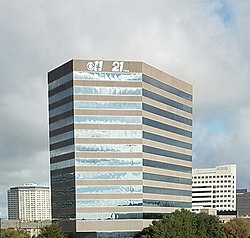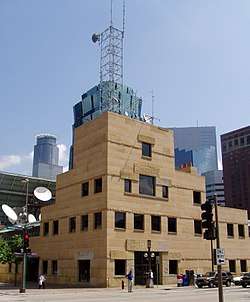CBS Television Stations
CBS Television Stations is a division of the CBS Entertainment Group unit of ViacomCBS that owns and operates a group of American television stations. As of April 2020, ViacomCBS owns 29 stations, broken down as follows: fifteen are the core stations of the CBS Television Network; eight are aligned with The CW Television Network, which is co-owned by ViacomCBS with WarnerMedia; one Start TV affiliate, and five independent stations, two of which carry the MyNetworkTV programming service in primetime.
| Division | |
| Industry | TV broadcasting |
| Founded | 1941 (as CBS's owned-and-operated stations division) |
| Headquarters | New York City, United States |
Key people |
|
| Revenue | $1.6 billion (2014[1]) |
| Parent | CBS Entertainment Group (ViacomCBS) |
| Website | Website |
The CBS Television Network first broadcast on July 1, 1941, with its initial owned-and-operated station, WCBS-TV (then known as WCBW) in New York City. Other owned-and-operated stations were acquired through an ownership stake or outright purchase instead of being built by the network. The Westinghouse Electric Corporation's purchase of CBS in 1995 then merged the network's owned-and-operated stations with those of Westinghouse Broadcasting (Group W). With the subsequent 2000 merger with Viacom, the CBS-owned stations were combined with Viacom's Paramount Stations Group to form the Viacom Television Stations Group. The group was then renamed CBS Television Stations in 2006.
History
CBS Network (1941–1990s)
CBS's involvement in television dates back to the opening of experimental station W2XAB in New York City on July 21, 1931. On June 24, 1941, W2XAB received a commercial construction permit and program authorization as WCBW. Later renamed WCBS-TV, it would ultimately be the only station (as of 2020) originally built and signed on by CBS. The rest of the stations would be acquired by CBS, either in an ownership stake or outright purchase.
In 1950, when rival NBC was dominant in television and black and white transmission was widespread, did CBS begin to buy or build their own stations (outside of New York City) in Los Angeles, Chicago, and other major cities. Up to that point, CBS programming was seen on such stations as KTTV in Los Angeles, in which CBS – as a bit of insurance and to guarantee program clearance in that market – quickly purchased a 50% interest, partnering with the Los Angeles Times. CBS then sold its interest in KTTV (now the West Coast flagship of the Fox network) and purchased outright Los Angeles pioneer station KTSL in 1950, renaming it KNXT (after CBS's existing Los Angeles radio property, KNX), later to become KCBS-TV. In 1953, CBS bought pioneer television station WBKB in Chicago, which had been signed on by former investor Paramount Pictures (and would become a sister company to CBS again decades later) as a commercial station in 1946, and changed that station's call sign to WBBM-TV, moving the CBS affiliation away from WGN-TV.
The network bought Washington, D.C. affiliate WOIC (now WUSA) in a joint venture with The Washington Post in 1950, only to sell its stake to the Post in 1954 due to tighter FCC ownership regulations. CBS would also temporarily rely on UHF technology by owning WXIX in Milwaukee (now CW affiliate WVTV) and WHCT in Hartford (now Univision affiliate WUVN), but as UHF was not viable for broadcasting at the time (due to the fact that most television sets of the time were not equipped with UHF tuners), CBS decided to sell those stations off and affiliate with VHF stations WITI and WTIC-TV (now WFSB). More long-term, CBS bought stations in Philadelphia (WCAU, now owned by NBC) and St. Louis (KMOX-TV, now KMOV), but would eventually sell these stations off as well; before buying KMOX-TV, CBS had attempted to purchase and sign on the channel 11 license in St. Louis, now KPLR-TV.[2]
CBS did attempt to sign on a station in Pittsburgh, as it was at the time the sixth-largest market but had just one commercial VHF station in DuMont-owned WDTV, while the rest were either on UHF (the modern-day WPGH-TV and WINP-TV) or public television (WQED). Although the FCC turned down CBS's request to buy the channel 9 license in nearby Steubenville, Ohio and move it to Pittsburgh (that station, initially CBS affiliate WSTV-TV, is now NBC affiliate WTOV-TV), CBS did score a major coup when Pittsburgh-based Westinghouse Electric, a co-founder of NBC with RCA, bought WDTV from struggling DuMont and opted to affiliate the now-recalled KDKA-TV with CBS instead of NBC (like KDKA radio) due to NBC extorting and coercing Westinghouse to trade KYW radio and WPTZ (now KYW-TV) for Cleveland stations WTAM, WTAM-FM (now WMJI), and WNBK (now WKYC); the trade ended up being reversed in 1965 by order of the FCC and the Department of Justice after an eight-year investigation.[3] Had CBS not been able to affiliate with KDKA-TV, it would have affiliated with eventual NBC affiliate WIIC-TV (now WPXI) once it signed on in 1957 instead.[4] This coup would eventually lead to a much stronger relationship between Westinghouse and CBS.
After losing a bid in 1987 to purchase then-CBS affiliate WTVJ in Miami, CBS bought WCIX (now WFOR) instead.[5][6][7]
CBS then acquired Midwest Communications in 1992, which owned WCCO-TV in Minneapolis and WFRV-TV in Green Bay.[8]
Merger with Westinghouse (1990s)
In 1994, the Fox Broadcasting Company agreed to a multi-year, multi-station affiliation deal with New World Communications, resulting in most of New World's stations switching to Fox.[9] This set off a chain of affiliation changes across the country and other multi-station affiliation deals for the next couple of years. Unable to find a station who would agree to replace New World's WJBK-TV in Detroit, CBS struck an eleventh-hour deal to purchase UHF station WGPR (now WWJ-TV) outright.[10] CBS also had trouble finding a station who would agree to replace New World's WAGA in Atlanta, and therefore bought UHF station WVEU (now WUPA) out of desperation, even though WVEU had the lowest ratings and the weakest signal out of Atlanta's full-power stations.[10] However, late in November 1994, WGNX (now WGCL-TV) changed their minds and agreed to affiliate with CBS, and so CBS ended up selling WVEU to Viacom in May 1995.[11]
The Westinghouse Electric Corporation, through its Westinghouse Broadcasting (Group W) division, sought an affiliation deal of its own, and after several months of negotiations with the other networks, Westinghouse agreed to affiliate its entire television unit with CBS.[12] Among the Group W stations, KPIX in San Francisco and KDKA-TV in Pittsburgh were already CBS affiliates. WJZ-TV in Baltimore and WBZ-TV in Boston switched from ABC and NBC, respectively, to CBS, while WBAL-TV and WHDH-TV affiliated with NBC; WMAR-TV took on WJZ-TV's ABC affiliation. In Philadelphia, the Westinghouse affiliate deal resulted in a three-way transaction between Group W, CBS, and NBC in 1995. Group W's KYW-TV switched from NBC to CBS. CBS traded its previous Philadelphia station, WCAU-TV, to NBC in return for KCNC-TV in Denver and KUTV in Salt Lake City, while KUSA and KSL-TV affiliated with NBC. The swap in Philadelphia was delayed when CBS discovered it would face a massive capital gains tax bill if it sold WCAU to NBC outright.[13]
Westinghouse would then buy CBS outright, a transaction which closed in late 1995.[14] CBS had also bought WPRI-TV in Providence, Rhode Island in early 1995 prior to the deal closing. At the time, the FCC normally did not allow common ownership of multiple stations with overlapping coverage areas, so WPRI was sold off in favor of Westinghouse's nearby WBZ in Boston. Following the completion of the CBS takeover, the former Westinghouse Broadcasting operations took on the CBS name and identity, though the Group W name survived until the end of the 1990s as a holding company within the merged entity's structure. In 1997, Westinghouse changed its name to CBS Corporation.
When CBS/Westinghouse began purchasing several broadcasting assets from Gaylord Entertainment during the late 1990s, these transactions included the acquisition of KTVT in Dallas.
Merger with Viacom (2000–present)
On May 24, 2000, with the merger of Viacom and CBS Corporation, Viacom's Paramount Stations Group were combined with CBS's owned-and-operated stations division to form the Viacom Television Stations Group. At the time, Viacom owned the UPN network and the Paramount Stations Group controlled UPN's owned-and-operated stations.[15][16] The merger created duopolies between CBS and UPN stations in Philadelphia (KYW-TV and WPSG), Boston (WBZ-TV and WSBK-TV), Miami (WFOR and WBFS-TV), Dallas–Fort Worth (KTVT and KTXA), Detroit (WWJ-TV and WKBD-TV) and Pittsburgh (KDKA-TV and WNPA).
Viacom had also exercised a contractual clause that forced Chris-Craft Industries to either buy Viacom out of UPN, or have the former sell its ownership stake in the network to Viacom. On March 20, 2000, Chris-Craft allowed Viacom to buy out its 50% stake, giving Viacom full control of the network.[17] However on August 12 of that year, Fox Television Stations outbid Viacom for Chris-Craft's UPN stations.[18]
Viacom then took full control of UPN affiliates WTVX in Fort Pierce, Florida and WLWC in New Bedford, Massachusetts from Straightline Communications in 2001, after the Paramount Stations Group had operated the two stations through local marketing agreements since 1997.
In 2002, Viacom traded UPN stations KTXH in Houston and WDCA in Washington, D.C. to Fox in exchange for KBHK-TV (now KBCW) in San Francisco, one of the former Chris-Craft stations, resulting in the creation of a duopoly with CBS-owned KPIX. Viacom also bought independent Los Angeles station KCAL-TV in 2002,[19] creating a duopoly with CBS-owned KCBS, which broadcasting industry observers also speculated was done to use as possible future leverage against UPN affliate KCOP-TV, another former Chris-Craft station owned by Fox.
In 2005, Viacom bought CBS-affiliate KOVR in Sacramento, resulting in another duopoly with UPN-owned-and-operated KMAX-TV. Viacom also purchased the low-powered stations WTCN-CA and WWHB-CA,[20] integrating their local operations with WTVX.[21]
Viacom also sold some of their stations, creating duopolies for their new owners instead. The UPN-owned-and-operated WUPL was sold to Belo Corporation, owners of CBS affiliate WWL-TV in New Orleans, after Belo turned down Viacom's offer to purchase WWL. On February 10, 2005, UPN-owned stations WNDY-TV in Indianapolis and WWHO in Columbus, Ohio were sold to the LIN TV Corporation, owners of then-CBS Indianapolis affiliate WISH-TV.[22] Later on November 4, 2005, The New York Times Company bought UPN-owned-and-operated station KAUT-TV to create a duopoly with NBC affiliate KFOR-TV in Oklahoma City.
The Viacom Television Stations Group was then rebranded to its current name on January 3, 2006, after Viacom split itself into two publicly traded companies, the second incarnations of CBS Corporation and Viacom, both of which remained controlled by National Amusements.[23]
On January 24, 2006, CBS Corporation and Time Warner announced that it would shut down UPN and competitor The WB to launch The CW later that September.[24][25] The formation of The CW to replace both UPN and The WB triggered the 2006 United States broadcast TV realignment, a chain of affiliation changes across the country and the establishment of competitor MyNetworkTV. On the day of the network launch announcement, The CW immediately announced it had reached affiliation agreements with Tribune Broadcasting (who had owned a stake in The WB) and CBS Television Stations. Tribune originally committed 16 stations that were previously affiliated with The WB, while CBS committed 11 of its UPN stations. Both companies also owned several UPN and WB-affiliated stations that did not join The CW in overlapping markets; these stations either later affiliated with MyNetworkTV or another network, or became completely independent. As part of its affiliation agreement with the network, the Tribune Company agreed to divest its ownership interest in The WB (a move it made partly to avoid shouldering shutdown costs for The WB).[26] and did not acquire an equity stake in The CW.
In 2007, CBS-owned-and-operated WFRV-TV in Green Bay and its satellite WJMN-TV in Escanaba, Michigan were sold to Liberty Media.[27][28] That same year, Cerberus Capital Management formed the holding company Four Points Media Group to serve as a buyer for seven stations, including CBS-owned-and-operated stations KUTV in Salt Lake City and KEYE-TV in Austin, Texas; and The CW-owned-and-operated WTVX in Fort Pierce, Florida and WLWC in New Bedford, Massachusetts. Also including were KUSG (now KMYU) in St. George, Utah, which served as satellite station of KUTV; and WTCN-CA and WWHB-CA, the sister stations to WTVX. The sale with Four Points closed on January 10, 2008.[29]
In 2009 and 2010, three managers at its New York City station, WCBS-TV, were named CBS Television Stations executives while continuing to manage at the station. Station manager Peter Dunn was named CBS Television Stations President in November 2009.[23] Station creative services director Bruce Erik Brauer was named in June 2010 senior vice president of creative services for the group. WCBS news director David Friend became the group's senior vice president of news in August 2010.[30]
On June 14, 2010, Local TV, owner of CBS affiliate WTKR, acquired The CW-owned-and-operated WGNT to create its own duopoly in the Hampton Roads area.[31]
On October 21, 2014, CBS and Weigel Broadcasting announced the launch of a new digital subchannel service called Decades, scheduled to launch on all CBS owned and operated stations in May 2015.[32][1] The channel is co-owned by CBS and Weigel, with Weigel being responsible for distribution to stations outside CBS Television Stations. It airs programs from the extensive library of CBS Television Distribution, including archival footage from CBS News.[32] On July 18, 2018, CBS and Weigel announced that another new subchannel service, Start TV, would launch on September 4; the new service replaced Decades on the CBS-owned stations.[33] An additional CBS-owned subchannel service, Dabl, launched on September 9, 2019; this service, although carried on the CBS Television Stations, is run by CBS Television Distribution.[34]
The station group made a couple of content agreements in 2014 and 2015. The stations agreed in December 2014 for its content to be shown on Curb's Taxi TV.[1] In November 2015, the station group agreed to allow Health Media Network to air local news reports on its network in doctor’s waiting rooms.[35]
On August 1, 2018, CBS Television Stations and CBS Interactive announced plans to launch CBSN Local, a group of streaming news channels modeled on the national CBSN service.[36] The first of these services, CBSN New York, launched on December 13, 2018,[37] with the remaining services launching during 2019 and 2020.[38]
CBS and Viacom then merged for the second time, forming ViacomCBS, on December 4, 2019.[39]
Stations
Currently many of CBSTS' stations, especially CBS outlets, use a common look in branding. Most of the group's CBS stations brand themselves under the "CBS [Channel number]" format (e.g. WCBS-TV, CBSTS' flagship station on channel 2, brands itself as "CBS 2"). This is the same practice as many other O&O groups across the U.S. Only five CBS-owned stations do not use such a branding convention.
Stations are arranged in alphabetical order by state and city of license.
Current
Notes:
- (*) - indicates WCBS-TV as the only station that was built and signed-on by CBS.
- (+) - indicates a station that was owned by Westinghouse Broadcasting prior to its acquisition of CBS in 1995.
- (§) - indicates a station that was affected by a 1995 ownership swap between CBS/Westinghouse and NBC.
- (¤) - indicates a station that was owned by Gaylord Broadcasting prior to its sale to CBS in 1999.
- (#) - indicates a station that was owned by the original Viacom prior to its acquisition of CBS in 2000.
| City of license / Market | Station | Channel TV (RF) |
Owned since | Affiliation |
|---|---|---|---|---|
| Los Angeles | KCBS-TV | 2 (31) | 1951 | CBS |
| KCAL-TV | 9 (9) | 2002 | Independent | |
| Sacramento - Stockton - Modesto | KOVR | 13 (25) | 2005 | CBS |
| KMAX-TV # | 31 (24) | 2000 | The CW | |
| San Francisco - Oakland - San Jose | KPIX-TV + | 5 (29) | 1995 | CBS |
| KBCW | 44 (28) | 2002 | The CW | |
| Denver | KCNC-TV | 4 (35) | 1995 § | CBS |
| Miami - Fort Lauderdale | WFOR-TV | 4 (22) | 1989 | CBS |
| WBFS-TV # | 33 (32) | 2000 | MyNetworkTV | |
| St. Petersburg - Tampa | WTOG # | 44 (44) | 2000 | The CW |
| Atlanta | WVEU/WUPA # | 69 (36) | 2000 (prior under CBS: 1994–1995) |
The CW |
| Chicago | WBBM-TV | 2 (12) | 1953 | CBS |
| Indianapolis | WBXI-CD # Digital Class A LPTV |
47 (36) | 2000 | Start TV |
| Baltimore | WJZ-TV + | 13 (13) | 1995 | CBS |
| Boston | WBZ-TV + | 4 (20) | 1995 | CBS |
| WSBK-TV # | 38 (21) | 2000 | MyNetworkTV | |
| Detroit | WWJ-TV | 62 (21) | 1995 | CBS |
| WKBD-TV # | 50 (34) | 2000 | The CW | |
| Minneapolis - St. Paul | WCCO-TV | 4 (32) | 1992 | CBS |
| KCCW-TV (satellite of WCCO-TV) |
12 (12) | 1992 | CBS | |
| New York City | WCBS-TV * | 2 (36) | 1941 | CBS |
| WLNY-TV | 55 (29) | 2012 | Independent[40] | |
| Philadelphia | KYW-TV + | 3 (30) | 1995 | CBS |
| WPSG # | 57 (33) | 2000 | The CW | |
| Pittsburgh | KDKA-TV + | 2 (25) | 1995 | CBS |
| WPCW # | 19 (11) | 2000 | The CW | |
| Dallas–Fort Worth | KTVT ¤ | 11 (19) | 1999 | CBS |
| KTXA # | 21 (18) | 2000 | Independent | |
| Tacoma - Seattle | KSTW # | 11 (11) | 2000 | The CW |
Former
- Note: This list also contains stations that were owned and operated by CBS prior to the 2000 merger with Viacom and the subsequent establishment of the CBS Television Stations division.
| City of license / Market | Station | Channel TV (RF) |
Years owned | Current ownership status |
|---|---|---|---|---|
| Los Angeles | KTTV 1 | 11 (11) | 1949–1951 | Fox owned-and-operated (O&O) |
| Hartford - New Haven | WGTH-TV/WHCT-TV | 18 (22) | 1955–1958 | Univision affiliate, WUVN, owned by Entravision Communications |
| Washington, DC | WTOP-TV 2 | 9 (9) | 1950–1954 | CBS affiliate, WUSA, owned by Tegna Inc. |
| WDCA ## | 20 (35) | 2000–2001 | MyNetworkTV owned-and-operated (O&O) | |
| West Palm Beach | WTVX 3 | 34 (34) | 2001–2008 | The CW affiliate owned by Sinclair Broadcast Group |
| WTCN-CA | 34.3 | 2005–2008 | MyNetworkTV affiliate owned by Sinclair Broadcast Group Still broadcasts in analog on channel 50. | |
| WWHB-CA | 34.2 | 2005–2008 | Azteca America affiliate owned by Sinclair Broadcast Group Still broadcasts in analog on channel 48. | |
| Indianapolis | WNDY-TV ## | 23 (32) | 2000–2005 | MyNetworkTV affiliate owned by Circle City Broadcasting |
| Slidell - New Orleans | WUPL ## | 54 (24) | 2000–2007 | MyNetworkTV affiliate owned by Tegna Inc. |
| Alexandria, Minnesota | KCCO-TV (satellite of WCCO-TV) |
7 (7) | 1992–2017 | defunct, went dark in 2017 |
| St. Louis | KMOX-TV | 4 (24) | 1958–1986 | CBS affiliate, KMOV, owned by Meredith Corporation |
| Chillicothe - Columbus, OH | WWHO | 53 (23) | 2000–2005 | The CW affiliate owned by Manhan Media (operated via SSA by Sinclair Broadcast Group) |
| Oklahoma City | KAUT-TV ## | 43 (19) | 2000–2005 | Independent station owned by Nexstar Media Group |
| Philadelphia | WCAU-TV | 10 (28) | 1958–1995 §§ | NBC owned-and-operated (O&O) |
| Providence, RI - New Bedford, MA | WPRI-TV | 12 (13) | 1995–1996 | CBS affiliate owned by Nexstar Media Group |
| WLWC 3 | 28 (22) | 2001–2008 | Ion Life owned-and-operated (O&O), owned by Ion Media | |
| Austin, TX | KEYE-TV | 42 (34) | 2000–2008 | CBS affiliate owned by Sinclair Broadcast Group |
| Houston | KTXH | 20 (19) | 2000–2001 | MyNetworkTV owned-and-operated (O&O) |
| Salt Lake City | KUTV | 2 (34) | 1995–2008 §§ | CBS affiliate owned by Sinclair Broadcast Group |
| KUSG | 12 (9) | 1999–2008 | MyNetworkTV affiliate, KMYU, owned by Sinclair Broadcast Group | |
| Portsmouth - Norfolk - Newport News | WGNT ## | 27 (50) | 2000–2010 | The CW affiliate owned by the E. W. Scripps Company |
| Green Bay, WI | WFRV-TV | 5 (22) | 1992–2007 | CBS affiliate owned by Nexstar Media Group |
| Escanaba - Marquette, MI | WJMN-TV (satellite of WFRV-TV) |
3 (32) | 1992–2007 | CBS affiliate owned by Nexstar Media Group |
| Milwaukee | WXIX-TV | 18 (27) | 1955–1959 | The CW affiliate, WVTV, owned by Sinclair Broadcast Group |
Other Notes:
- 1 Co-owned with the Los Angeles Times in a joint venture (49% owned by CBS, 51% owned by the Times).
- 2 Co-owned with the Washington Post in a joint venture (45% owned by CBS, 55% owned by the Post).
- 3 Operated by the original Viacom through its Paramount Stations Group via local marketing agreement (LMA) from 1997 until Viacom/CBS acquired the station outright in 2001.
References
- Miller, Mark K. (June 3, 2015). "Status Quo Rules Top 30 Station Groups". TVNewsCheck. NewsCheckMedia LLC. p. 2. Retrieved October 26, 2016.
- "St. Louis Handshake" (PDF). Broadcasting Telecasting. September 9, 1957. p. 5. Retrieved July 29, 2017.
- "Philadelphia Circle is Complete/Nine-year history of that trade in Philadelphia" (PDF). Broadcasting. August 3, 1964. pp. 23–25. Retrieved July 29, 2017.
- "Pittsburgh Ch. 11 Grantee to be CBS-TV Primary Outlet" (PDF). Broadcasting Telecasting. June 20, 1955. pp. 89–90. Retrieved July 29, 2017.
- "CBS purchases WCIX(TV) Miami." Broadcasting, August 15, 1988, pp. 65–66. Accessed January 13, 2019.
- Stations To Change On TV Dial, CBS Buys Channel 6, Signs Up Channel 12, South Florida Sun-Sentinel, August 9, 1988.
- "THE MEDIA BUSINESS; CBS to Buy TV Station In Miami". The New York Times. August 9, 1988.
- Lahammer, Gene. "CBS Agrees to Buy Two TV Stations, Two Radio Stations and Cable Channel". AP NEWS.
- Foisie, Geoffrey. "Fox and the New World order." Broadcasting and Cable, May 30, 1994, pp. 6, 8. Retrieved February 13, 2013.
- Carter, Bill (24 September 1994). "CBS Buys 2 UHF Stations To Serve Atlanta and Detroit". The New York Times. Retrieved 23 January 2013.
- Zier, Julie A. (15 May 1995). "Viacom takes WVEU off CBS's hands" (PDF). Broadcasting. Retrieved 18 September 2016.
- Zier, Julie A. (July 18, 1994). "CBS, Group W form historic alliance" (PDF). Broadcasting and Cable. Archived from the original (PDF) on September 30, 2013. Retrieved February 13, 2013.
- "From the official archives of the Broadcast Pioneers of Philadelphia". Retrieved September 2, 2012.
- Kandell, Johnathan (16 November 2012). "Obituary: Laurence A. Tisch, Investor Known for Saving CBS Inc. From Takeover, Dies at 80". The New York Times. Retrieved 12 July 2012.
- Wilkerson, David B. (May 24, 2000). "Viacom merges CBS, UPN TV stations". MarketWatch. Retrieved November 24, 2018.
- "CBS timeline of milestones" (Press release). CBS Press Express. October 23, 2003. Retrieved November 24, 2018.
- Bill Carter (March 21, 2000). "Viacom Buys Chris-Craft's Stake in UPN For $5 Million". The New York Times. The New York Times Company. Archived from the original on November 17, 2015. Retrieved September 2, 2015.
- Hofmeister, Sallie (August 12, 2000). "News Corp. to Buy Chris-Craft Parent for $5.5 Billion, Outbidding Viacom". Los Angeles Times. Retrieved 23 March 2011.
- Viacom Exceeds Forecasts, Says It Will Buy Channel 9, Los Angeles Times, February 14, 2002. Retrieved May 11, 2013.
- WTCN's Brothers Cashes Out As Viacom Beefs Up Station, by Bob Betcher, Stuart News, April 17, 2005
- https://web.archive.org/web/20031012035637/http://upn34.com/jobs/miamijobs_story_254111556.html
- LIN buys UPN pair, The Hollywood Reporter, February 10, 2005. Retrieved June 26, 2014 from HighBeam Research.
- Albiniak, Paige (November 9, 2009). "Dunn to run CBS stations". Broadcasting & Cable. Retrieved December 4, 2019.
- Crupi, Anthony (January 24, 2006). "UPN, WB to Merge Into CW Network". AdWeek. Prometheus Global Media. Archived from the original on March 4, 2016. Retrieved February 12, 2017.
- Seid, Jessica (January 24, 2006). "'Gilmore Girls' meet 'Smackdown'; CW Network to combine WB, UPN in CBS-Warner venture beginning in September". CNNMoney.com. Time Warner. Archived from the original on March 16, 2017. Retrieved February 12, 2017.
- "Conference Call Regarding "The CW"". Archived from the original on September 26, 2007. Retrieved July 20, 2013.CS1 maint: BOT: original-url status unknown (link)
- http://biz.yahoo.com/e/090227/lcapa10-k.html
- "Archived copy". Archived from the original on May 1, 2007. Retrieved April 11, 2007.CS1 maint: archived copy as title (link)
- "CBS Corporation Completes Sale of Local TV Stations to Cerberus" (Press release). CBS Corporation. 2008-01-10. Archived from the original on 2008-01-20. Retrieved 2008-01-11.
- "Friend Named Head of News at CBS Owned Stations". Broadcasting & Cable. NewBay Media, LLC. August 10, 2010. Retrieved October 26, 2016.
- Local TV Acquiring CBS Owned WGNT Broadcasting and Cable June 14, 2010.
- Malone, Michael (October 21, 2014). "CBS Stations, Weigel Partner on Oldies Digi-Net Decades". Broadcasting & Cable. NewBay Media, LLC. Retrieved October 26, 2016.
- Robert Feder (July 19, 2018). "Weigel to launch Start TV digital network with CBS Television Stations". RobertFeder.com. Retrieved August 28, 2018.
- Littleton, Cynthia (June 17, 2019). "CBS to Launch DABL Digital Lifestyle Channel in September". Variety. Retrieved December 4, 2019.
- Eck, Kevin (November 3, 2015). "CBS Television Stations Partner With Digital Health Network". Ad Week. Retrieved October 26, 2016.
- Hayes, Dade (August 1, 2018). "CBS Plans To Launch Local Streaming Portfolio Modeled On CBSN". Deadline. Retrieved December 5, 2019.
- Malone, Michael (December 13, 2018). "CBS Television Stations Launch CBSN New York". Broadcasting & Cable. Retrieved December 5, 2019.
- Malone, Michael (August 8, 2019). "All CBSN Local Launches to Happen By Early 2020". Broadcasting & Cable. Retrieved December 5, 2019.
- Littleton, Cynthia (December 4, 2019). "CBS and Viacom Complete Merger: 'It's Been a Long and Winding Road to Get Here'". Variety. Retrieved December 4, 2019.
- "CBS Will Bring News And HD To Its Second NYC Station". Deadline. Penske Business Media, LLC. April 2, 2012. Retrieved October 26, 2016.



_-_053.jpg)

